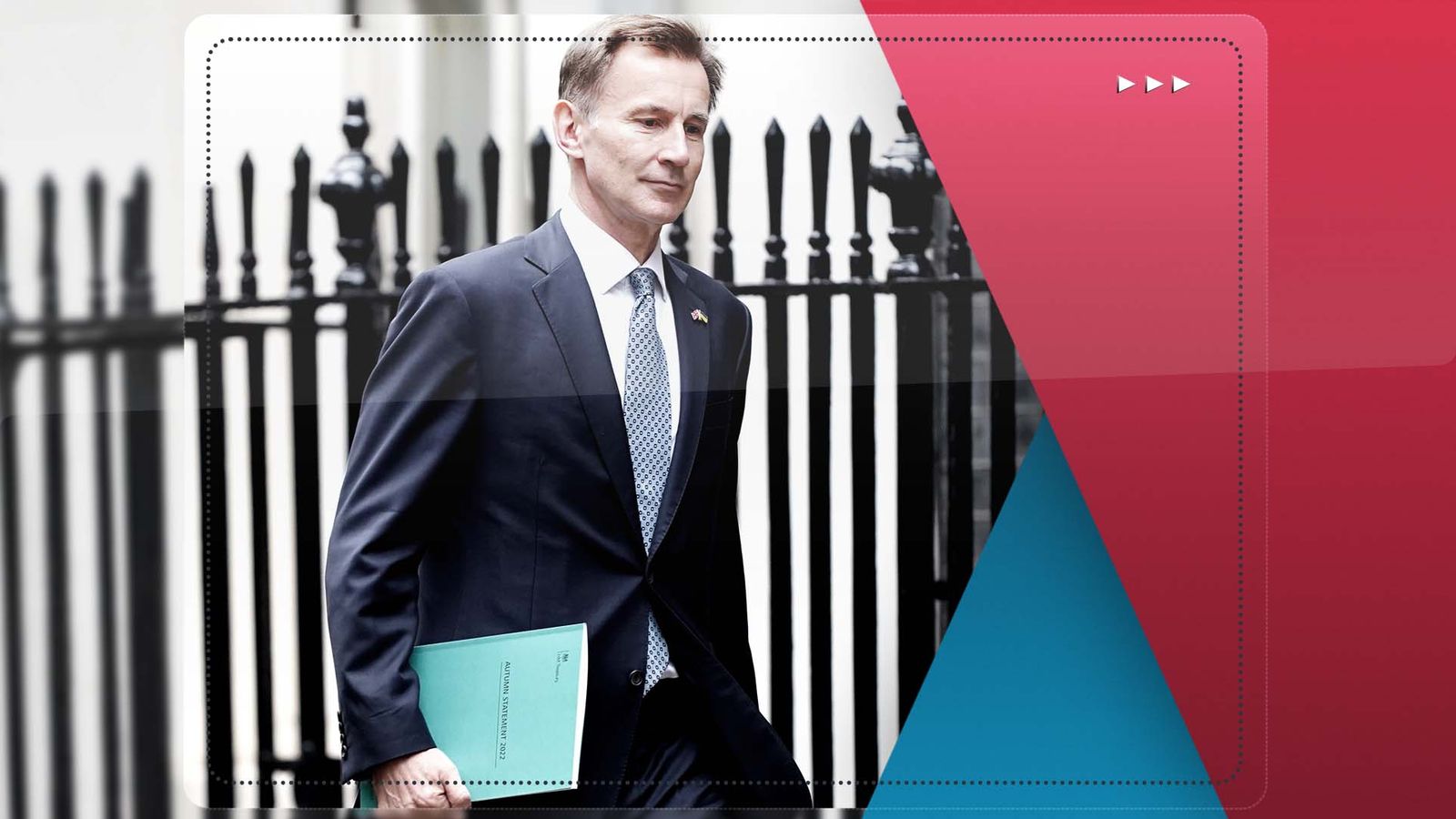Jeremy Hunt will update the government’s tax and spending plans next week as he delivers his first Budget as chancellor.
On the same day – 15 March – the Office for Budget Responsibility (OBR) will publish its latest five-year forecasts for the economy and public finances.
Mr Hunt entered Number 11 Downing Street when former prime minister Liz Truss sacked Kwasi Kwarteng following his disastrous mini-budget in September last year.
In his autumn statement, he scrapped much of what Mr Kwarteng had announced and laid out a five-year package of tax hikes and spending cuts, which he said would help steer the UK through a recession.
Mr Hunt will deliver this Budget against the backdrop of falling energy prices and higher-than-expected tax revenues.
But there is also potential for the OBR to downgrade its growth forecast – and the Bank of England still expects a recession in 2023.
In February, the OBR said public borrowing this financial year had been £30.6bn less than predicted, prompting demands from striking sectors for increased public sector pay and calls from some Tory MPs for tax cuts.
Spring budget 2023: When is it and what is likely to be in Jeremy Hunt’s financial statement?
The autumn statement | Chancellor Jeremy Hunt and Simon Clarke
Business Secretary Grant Shapps hints at autumn budget windfall tax expansion on energy firms due to ‘unexpected profits’
But in response, Mr Hunt refused to commit more money to public services or reduce the tax burden.
Politics Hub: Follow the latest on the build-up to the Budget
In the statement on Wednesday, he is expected to focus on measures to support the government’s plan to halve inflation, grow the economy and reduce public debt.
Here are some of the things to look out for when the chancellor delivers his statement:
Please use Chrome browser for a more accessible video player
Energy prices
Support for energy bills from the government is expected to continue for three months from April, protecting consumers from an average increase of £500 at a cost to the Treasury of around £3bn.
Sky News understands the chancellor will cancel a reduction in financial assistance that would have seen typical annual bills rise from £2,500 to £3,000.
Ministers have asked energy suppliers to prepare for both scenarios, fuelling a widespread expectation in the industry that the current energy price guarantee (EPG) will be maintained.
The EPG effectively caps the price households can pay and reimburses energy companies for the difference between that and the cost of buying power on wholesale markets.
However, a planned withdrawal of the £400 winter discount that went to every household is expected to go ahead.
Fuel duty
Mr Hunt is facing pressure from Conservative MPs to extend the 5p cut to fuel duty for another year.
The measure was announced in March 2022 following a rise in pump prices after Russia invaded Ukraine.
Former home secretary Priti Patel is among 40 Tory MPs calling for the duty to remain frozen but preferably cut.
There was backlash following the autumn statement in November, when an accompanying OBR report said a “planned 23% increase” would likely see petrol and diesel rise by around 12p a litre, boosting government coffers by £5.7bn.
The Treasury said the figure was based on forecasts that “are subject to change” and decisions on fuel duty rates “will be made at the spring budget”.
If Mr Hunt were to raise fuel duty, it would be the first rate rise since 1 January 2011, despite government policy being that the rate should rise with inflation. For the last 12 years, successive chancellors have cancelled the inflationary increase.
Please use Chrome browser for a more accessible video player
Defence budget
Given the growing security threat posed by Russia and the impact of high inflation since the start of the conflict, what the chancellor says about defence spending will be watched closely.
The former prime minister Liz Truss had pledged to lift the defence budget from 2.5% to 3% of GDP by the end of the decade, but Rishi Sunak has made no such commitment.
During his Autumn Statement, Jeremy Hunt said he recognised the need to increase defence spending following the invasion of Ukraine.
But he said a decision on the specifics of any increase would depend on the findings of the updated integrated review of security and foreign policy. The publication of that review is expected in the days before the Budget.
Read more:
UK set to publish ‘major refresh’ of defence and security review
Shadow defence secretary calls on government to halt defence cuts
Sky’s security and defence editor, Deborah Haynes, revealed in January that a senior US general had privately told Defence Secretary Ben Wallace the British Army is no longer regarded as a top-level fighting force.
Defence sources told Sky News Mr Sunak risked failing as “wartime prime minister” unless he increased the defence budget by at least £3bn a year.
Mr Wallace is thought to have been pushing for up to £11bn extra over the next two years but may only receive less than half of that amount in the Budget.
Please use Chrome browser for a more accessible video player
Public sector pay
Below inflation pay offers have resulted in nurses, ambulance drivers, teachers, civil servants and rail workers all taking strike action in recent months.
Given high inflation, a mooted 3.5% average rise for next year, funded out of existing budgets, is unlikely to spell the end of industrial action.
There has been speculation the chancellor may announce back-dating some pay awards or one-off payments, but the Institute for Government thinktank says there are no “pain free” options for Mr Hunt.
The IFG says rejecting pay increases will “make it much harder for the government to address backlogs and other public service performance issues”.
However, they point out that funding increased pay from existing budgets “will likely necessitate painful cuts” to public services, while increasing budgets to accommodate higher wages would mean “increasing taxes, higher borrowing or cuts to other public spending”.
Please use Chrome browser for a more accessible video player
Childcare support
UK childcare costs are among the most expensive in the world, with full-time fees for a child under two at nursery reaching an average of £269 a week last year – equivalent to around £14,000 annually.
Last month, the Early Years Alliance told Sky News nursery fees are expected to increase even further, going up by an average of 8% – higher than in previous years.
Families with children aged one and two do not currently receive support to cover the period after parental leave ends and before free nursery hours are offered for three and four-year-olds.
Tory MPs have been pressing the chancellor to make childcare more affordable in the March budget to reduce pressure on families and enable more women to re-enter the workforce.
The Treasury is reportedly mulling several possible policies, ranging from increasing childcare support available for families claiming universal credit to a proposal by the Confederation of British Industry, which has urged the government to expand free childcare to all one and two years old.
Please use Chrome browser for a more accessible video player
Corporation tax and investment incentives
Next month, corporation tax is due to increase from 19% to 25% on profits over £250,000 – bringing in around £12bn to the Treasury year, according to government projections.
But business leaders and some Conservative MPs have called on the chancellor to soften the planned rate rise, given the headroom created by lower-than-expected borrowing. They argue the increase could exacerbate low levels of company investment in the UK.
There has been speculation Mr Hunt could announce some form of investment zones as an alternative – a policy favoured by former prime minister Liz Truss – which would afford companies operating within them lower tax rates.
Read more:
Ian King explains the debate around corporation tax
Hundreds of thousands of small businesses could fold this year
Business groups have also been lobbying for new “full-expensing” rules that would allow them to deduct certain investments from taxable profits.
The proposed rules would replace the “super deductor” introduced in 2021 by Rishi Sunak when he was chancellor, which expires in April.
The “super deductor” allowed companies to claim 130% capital allowances on investments in plant and machinery. The policy was intended to provide an incentive for businesses to make additional investments and to bring planned investments forward, but some analysts have questioned its effectiveness.
Please use Chrome browser for a more accessible video player
Work incentives and pension rules
Mr Hunt has previously spoken about getting Britain “back to work” by reducing the number of working-age people who are unemployed.
In the final quarter of last year, 8.89 million people aged 16-64 in the UK were “economically inactive”, according to the Office for National Statistics, with 28% saying long-term illness was why they were out of work.
Numbers have shot to record levels since the pandemic, and ministers believe reducing this is critical to lowering inflation, addressing the skills shortage and boosting growth.
In January, Mr Hunt promised to help get the long-term sick back to work and then directly appealed to retirees: “To those who retired early after the pandemic, or haven’t found the right role after furlough, I say – Britain needs you.“
The government is said to be drawing up plans to offer those over 50 a “midlife MoT” that will allow them to assess their financial health to woo them back to work.
Another idea that has reportedly been mooted is encouraging GPs to issue sick notes focusing on employees continuing to work with support rather than being signed off altogether.
Pension allowance rules and the cap on annual contributions could also be changed to address the so-called pensions trap – when people cut their hours or take early retirement to avoid higher taxes on their pensions.











